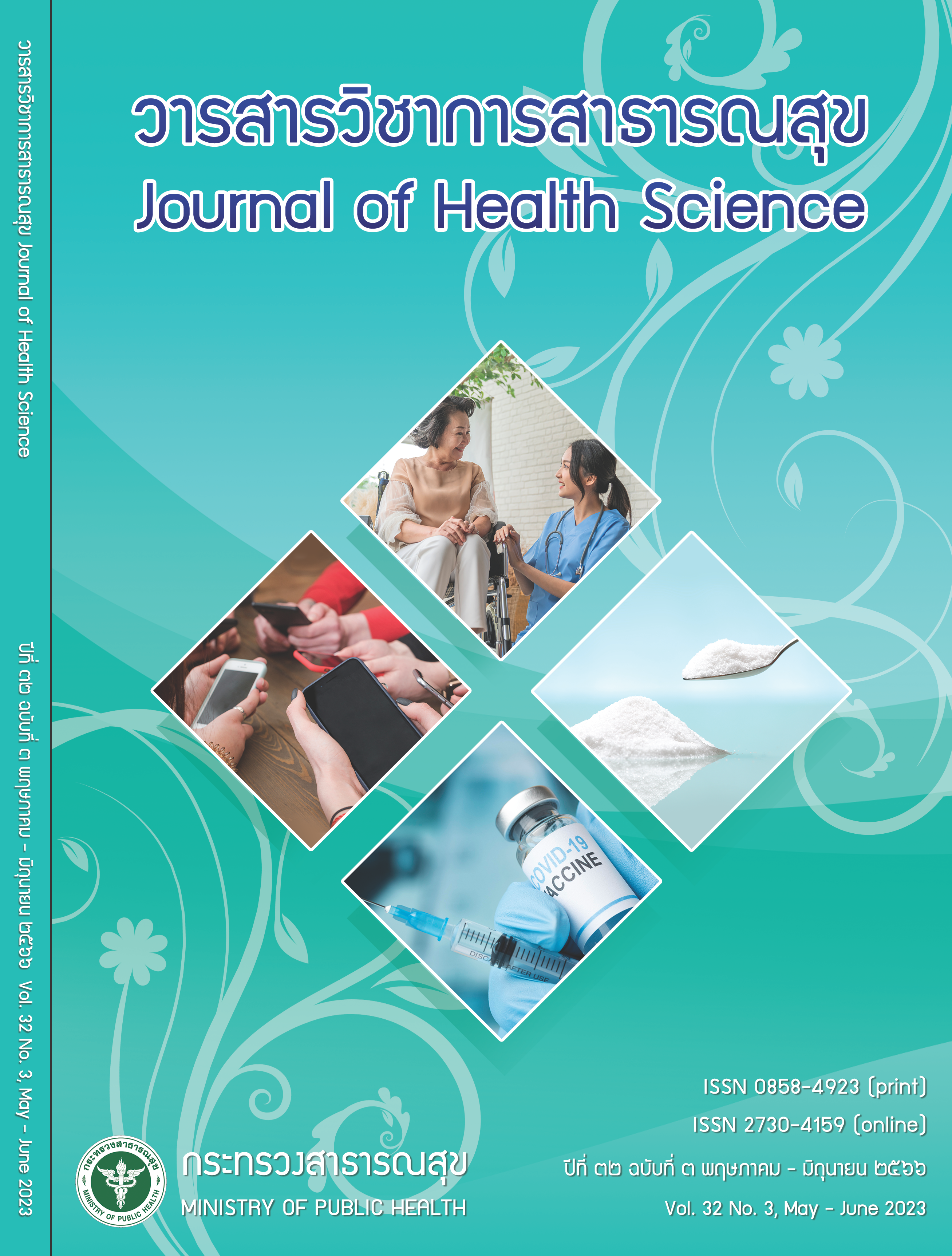Health Literacy and Information Sharing on Medicinal Herbs for COVID-19 Self-Care via Online Social Media among Thai People, 2022
Keywords:
fhealth literacy, information sharing, Thai medicinal herbs, COVID-19, online social mediaAbstract
This research aimed to explore the health literacy situation and motivation for information sharing, as well as to survey on health literacy related to the use of medicinal herbs for COVID-19 self-care via online social media in Thailand. The mixed methods approach was applied which involved qualitative and quantitative data collection from 15 December 2021 through 1 June 2022 on a sample of respondents selected by using the purposive sampling method with screening questions from those who used social media of the Department of Thai Traditional and Alternative Medicine during 2021–2022. The results revealed that, among the respondents: (1) health literacy on the use of medicinal herb knowledge obtained from Thai social media for COVID-19 self-care in 2022 was linked to the content of various media messages. In the past, Thai people were passive audience, but during this outbreak, they were more active, as COVID-19 was deemed as their immediate and serous problem. So they needed to seek knowledge and cooperate as informed or requested via the online media. (2) Overall, 92.5% had the highest level of motivation and information sharing – 85.5% with expectation for sharing with others at a high level and 85.8% with actual use of medicinal herbs for COVID-19 self-care at a high level; and 83.2% needed to be part of the community and 82.7% had a self-capacity perception at a high level. (3) Finally, concerning health literacy, 95.3% had access to basic health information for further analysis and making appropriate health decisions at the highest level, especially with regard to the people’s expected use of medicinal herbs. It is thus recommended that additional activities should be developed for further enhancing people’s health literacy in all dimensions and, for social policy-making, the medicinal herb knowledge should be included in school textbooks at all levels, and lifelong learning for creating sustainable health literacy in Thai society should be promoted.
Downloads
References
กองวิชาการและแผนงาน กรมการแพทย์แผนไทยและการ แพทย์ทางเลือก.“ฟ้าทะลายโจร” สมุนไพรไทยในวิกฤต COVID-19. การเสวนาวิชาการ (DTAM Forum); 17 มิถุนายน 2564; กรมการแพทย์แผนไทยและการแพทย์ทางเลือกกระทรวงสาธารณสุข. กรุงเทพมหานคร: บียอนด์ พับลิสชิ่ง; 2564.
พรรณวดี ชัยกิจ, สุมนทิพย์ จิตสว่าง. การแพร่กระจายของ ข่าวปลอมเกี่ยวกับการแพร่ระบาดของโควิด-19 และ มาตรการป้ องกันของไทย. วารสารรัชต์ภาคย์ 2564;15(40): 15-32.
เหมือนฝัน ไม่สูญผล. กระบวนการสื่อสารสุขภาพในบริบท การแพทย์แผนไทย [วิทยานิพนธ์ นิเทศศาสตร์ดุษฎีบัณฑิต]. กรุงเทพมหานคร: มหาวิทยาลัยธุรกิจบัณฑิตย์; 2557. 282 หน้า.
สิริลักษณ์ อุบลรัศมี. การเปิดรับสื่อ การแบ่งปันข้อมูล และ การรู้ เท่าทันข้อมูลด้ านสุขภาพในสื่อสังคมออนไลน์ [วิทยานิพนธ์ปริญญาวารสารศาสตรมหาบัณฑิต]. กรุงเทพมหานคร: มหาวิทยาลัยธรรมศาสตร์; 2560. 114 หน้า.
สำนักบริหารการทะเบียน. ประกาศสำนักทะเบียนกลาง เรื่อง จำนวนราษฎรทั่วราชอาณาจักร ตามหลักฐานการทะเบียน ราษฎร [อินเทอร์เน็ต]. 2565 [สืบค้นเมื่อ 31 พ.ค. 2565]. แหล่งข้อมูล: https://www.posttoday.com/politics/673371
Taro Y. Statistic: An introductory analysis. 2nd ed. New York: Harper & Row; 1970.
Likert R. The method of constructing and attitude scale. In: Fishbein, M (Ed.), Attitude theory and measurement. New York: Wiley & Son; 1967. p. 90-5.
กรมอนามัย. แนวคิดหลักการขององค์กรรอบรู้ด้านสุขภาพ. พิมพ์ครั้งที่ 1. กรุงเทพมหานคร: สำนักงานโครงการขับ เคลื่อนกรมอนามัย 4.0 เพื่อความรอบรู้ด้านสุขภาพของ ประชาชน; 2561. 32 หน้า.
Sørensen K, Brand H. Health literacy lost in translations? Introducing the European Health Literacy Glossary. Health Promot Int 2014;29(4):634-44.
Krejcie RV, Morgan DW. Determining sample size for research activities. Educational and psychological measurement. 1970;30:607-10.
Cronbach LJ. Essentials of psychological testing. 5th ed. New York: Harper Collins Publishers; 1990.
ชนวนทอง ธนสุกาญจน์. ความรอบรู้ด้านสุขภาพ [อินเทอร์เน็ต]. [สืบค้นเมื่อ 15 มี.ค. 2565]. แหล่งข้อมูล: http://doh. hpc.go.th/data/HL/HLO_chanuanthong.pdf
รพีพรรษ รัตนวงศ์นรา. ทำไมฉีด “วัคซีน” แล้ว ยังติดโควิด-19 [อินเทอร์เน็ต]. [สืบค้นเมื่อ 31 พ.ค. 2565]. แหล่งข้อมูล: https://www.sanook.com/health/30153/
กระทรวงสาธารณสุข. สธ.เตรียมทดลองฟ้ าทะลายโจร [อินเทอร์เน็ต]. [สืบค้นเมื่อ 12 ก.ค. 2565]. แหล่งข้อมูล: https://www.pptvhd36.com/news/ไลฟ์ สไตล์/151474.
สุรศักดิ์ สุนทร, ศรีสุดา งามขำ, กมลทิพย์ ตั้งหลักมั่นคง, บุญเตือน วัฒนกุล, ศุทธินี วัฒนกูล. การประเมินผลระบบ บริการจัดส่งยาทางไปรษณีย์สำหรับผู้ป่วยโรคเบาหวานใน สถานการณ์การระบาดของโรคโควิด-19 ในประเทศไทย [อินเทอร์เน็ต]. [สืบค้นเมื่อ 12 ก.ค. 2565]. แหล่งข้อมูล: https://shorturl.asia/EL5i1
ปทุมมา ลิ้มศรีงาม, ศรัณย์ธร ศศิธนากรแก้ว, วราพรรณ อภิศุภะโชค. การรับรู้ข้อมูลข่าวสารเกี่ยวกับเชื้อไวรัสโคโรนา 2019 (โควิด-19) ผ่านสื่อสังคมออนไลน์กับทัศนคติและ พฤติกรรมการป้องกันโรค ในกรุงเทพมหานคร. วารสารมหาจุฬานาครทรรศน์ 2564;8(9):18-33.
กรมสุขภาพจิต. สมุนไพรไทย ตัวช่วยต้านโควิด-19 [อินเทอร์เน็ต]. [สืบค้นเมื่อ 31 พ.ค. 2565]. แหล่งข้อมูล: https://dmh.go.th/news-dmh/view.asp?id=30588
โรงพยาบาลเจ้าพระยาอภัยภูเบศร จังหวัดปราจีนบุรี. คู่มือ การดูแลสุขภาพสำหรับประชาชนในสถานการณ์การแพร่ ระบาดของโควิด-19 ระลอก 3 ด้วยศาสตร์การแพทย์แผนไทยและ สมุนไพร [อินเทอร์เน็ต]. [สืบค้นเมื่อ 25 เม.ย. 2566]. แหล่ง ข้อมูล: http://dmsic.moph.go.th/index/detail/8731
กรุงเทพธุรกิจ. สัญญาณ “โควิด” ไทยขาลง พร้อมสู่โรคประจำถิ่น [อินเทอร์เน็ต]. [สืบค้นเมื่อ 3 พ.ค. 2565]. แหล่ง ข้อมูล: https://www.bangkokbiznews.com/social/1002153
สถานีสุขภาพ. แนะวิธีรักษาฟื้ นฟูร่างกาย เมื่อมี อาการ “ลอง โควิด” (Long COVID) [อินเทอร์เน็ต]. [สืบค้นเมื่อ 5 พ.ค. 2565]. แหล่งข้อมูล:https://www.pptvhd36.com/health/news/689
ณัฐริกา พร้อมพูน, กฤษิณี เหลื่อง, วรางคณา คงสวัสดิ์ , กฤติญา เส็งนา, ภูษณิศา มีนาเขตร. ความรอบรู้ทางสุขภาพ ด้านการป้องกันโรคโควิด-19 และพฤติกรรมสุขภาพแบบ ชีวิตใหม่ของนักศึกษาพยาบาล คณะพยาบาลศาสตร์ มหาวิทยาลัยอุบลราชธานี. วารสารสุขภาพและการพยาบาล มหาวิทยาลัยอุบลราชธานี 2565;1(1):15-27.
วิชัย เทียนถาวร, ณรงค์ ใจเที่ยง. ความรอบรู้ด้านสุขภาพกับ พฤติกรรมการป้องกันโรคโควิด-19 ในกลุ่มวัยเรียน มหาวิทยาลัยแห่งหนึ่ง. วารสารสาธารณสุขและวิทยาศาสตร์ สุขภาพ 2564;4(2):126-37.
ดุสิดา พุทธิไสย, ศรัณย์ธร ศศิธนากรแก้ว. การเข้าถึงสื่อสังคม ออนไลน์กับความรอบรู้ด้านสุขภาพของเจนเนอเรชั่นวาย. วารสารวิจัยราชภัฏพระนคร 2562;14(1):124-41.
เสาวภา ดงหงษ์, รุ่งรัตน์ ศรีสุริยเวศน์, พรนภา หอมสินธุ์. ปัจจัยที่มีความสัมพันธ์กับความรอบรู้ด้านสุขภาพของทหาร กองประจำการ จังหวัดชลบุรี. วารสารคณะพยาบาลศาสตร์ มหาวิทยาลัยบูรพา 2564;29(2):13-23.
กัลย์ ปิ่นเกษร. การแบ่งปันความรู้เชิงปรนัยและการแบ่งปัน ความรู้ที่ชัดแจ้งของโรงพยาบาลเอกชนในประเทศไทย [วิทยานิพนธ์ปรัชญาดุษฎีบัณฑิต]. กรุงเทพมหานคร: มหาวิทยาลัยศิลปากร; 2560. 412 หน้า.
พุฒิสรณ์ ย่อมเจริญ. การแบ่งปันข้อมูลการดูแลสุขภาพบน เครือข่ายสังคมออนไลน์. วารสารระบบสารสนเทศด้านธุรกิจ 2559;2(4):6-20.
Downloads
Published
How to Cite
Issue
Section
License

This work is licensed under a Creative Commons Attribution-NonCommercial-NoDerivatives 4.0 International License.





